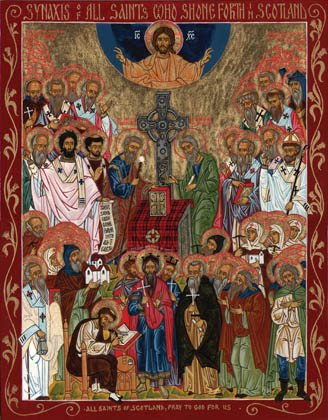The story and history of Saint Palladius of the Scots. The name of Palladius shows this Saint to have been a Roman, and most authors agree that he was deacon of the Church of Rome. At least St. Prosper, in his chronicle, informs us that when Agricola, a noted Pelagian, had corrupted the churches of Britain by introducing that pestilential heresy, Pope Celestine, at the instance of Palladius the deacon, in 429, sent thither St. Germanus, Bishop of Auxerre, in quality of his legate, who, having ejected the heretics, brought back the Britons to the Orthodox faith. In 431 Pope Celestine sent Palladius, the first bishop, to the Scots then believing in Christ. The Irish writers of the lives of St. Patrick say that St. Palladius had preached in Ireland a little before St. Patrick, but that he was soon banished by the King of Leinster, and returned to North Britain, where he had first opened his mission. There seems to be no doubt that he was sent to the whole nation of the Scots, several colonies of whom had passed from Ireland into North Britain, and possessed themselves of part of the country since called Scotland. After St. Palladius had left Ireland, he arrived among the Scots in North Britain, according to St. Prosper, in the consulate of Bassus and Antochius, in the year of Christ 431. He preached there with great zeal, and formed a considerable Church. The Scottish historians tell us that the Faith was planted in North Britain about the year 200, in the time of King Donald, when Victor was Pope of Rome. But they all acknowledge that Palladius was the first bishop in that country, and style him their first apostle. The Saint died at Fordun, fifteen miles from Aberdeen, about the year 450.
Feast Day of Saint Palladius of the Scots
The Feast Day of Saint Palladius of the Scots is July 6. The origin of Feast Days: most saints have specially designated feast days and are associated with a specific day of the year and these are referred to as the saint's feast day. The feast days first arose from the very early Christian custom of the annual commemoration of martyrs on the dates of their deaths at the same time celebrating their birth into heaven.
The Feast Day of Saint Palladius of the Scots is July 6. The origin of Feast Days: most saints have specially designated feast days and are associated with a specific day of the year and these are referred to as the saint's feast day. The feast days first arose from the very early Christian custom of the annual commemoration of martyrs on the dates of their deaths at the same time celebrating their birth into heaven.


No comments:
Post a Comment